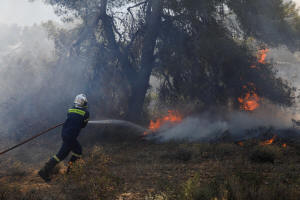Europe's heatwave reaches Poland, Greece as it moves eastwards, brings
wildfires
 Send a link to a friend
Send a link to a friend
 [July 22, 2022]
By Renee Maltezou and Federico Maccioni [July 22, 2022]
By Renee Maltezou and Federico Maccioni
ATHENS/MILAN (Reuters) - The vast heatwave
covering swathes of Europe moved steadily eastwards on Thursday, forcing
countries including Italy, Poland and Slovenia to issue their highest
heatwave alerts as firefighters battled wildfires across the continent.
Since temperatures in southern Europe began to soar earlier this month,
the heatwave has caused hundreds of deaths and sparked wildfires that
have burned tens of thousands of hectares of land in countries including
Spain, Portugal and France. Britain and France both saw record high
temperatures on Tuesday.
The extreme heatwave is part of a global patternof rising temperatures,
widely attributed by scientists andclimatologists to climate change
caused by human activity. It is forecast to dump searing heat on much of
China into late August.
Greece, which contained a huge wildfire that raged near Athens for two
days and was fanned by high winds, urged Europe to do more to tackle
climate change.
"The climate crisis is now evident across Europe, with particular
intensity in the wider Mediterranean region. The cocktail of high
temperatures, gusty winds and heavy drought inevitably leads to
wildfires," government spokesman Giannis Oikonomou said on Thursday.

"Europe must act in a coordinated and rapid manner to reverse the
climate crisis," Oikonomou told reporters. "The solution cannot be given
at a national level, because the problem is transnational and huge."
Greek fire fighters had tackled 390 forest fires in one week, about
50-70 blazes a day, he said. According to the meteorological station in
Penteli outside Athens, where the fire broke out on Tuesday, winds
reached 113 km per hour (70 mph) at one point.
Fuelled by climate change, wildfires are increasing in frequency and
intensity in many countries, spreading smoke that contains noxious
gases, chemicals and particulate matter and that can be damaging to
health.
MORE WILDFIRES
In Poland, the authorities issued heat warnings for many parts of the
country, with temperatures as high as 36.7 Celsius (98 Fahrenheit)
measured in the western town of Kornik. In the northern port city of
Gdansk, many residents and tourists headed for local beaches to cool
down.
A large wildfire fire broke out near the southern town of Brzesko, the
Onet news website reported. Firefighters told Onet that more than 50
hectares (120 acres) of fields had already burned, and that the fire was
moving towards a forest.
[to top of second column]
|

A firefighter tries to extinguish a wildfire burning in Pallini,
near Athens, Greece July 20, 2022. REUTERS/Costas Baltas

Temperatures in Poland are expected to ease on the
weekend.
In Italy, blazes in Tuscany and Friuli Venezia Giulia continued to
rage but did not appear to have spread, Italian news agency ANSA
reported. New wildfires were spotted in the mountains near Bologna
and bordering the A9 highway, north of Milan, it said.
Fourteen cities, including Rome and Milan, were placed on the
country's highest heatwave alert on Thursday, with the number set to
increase to 16 on Friday, the health ministry said.
ANSA also reported that a fire that began in northern Italy near
Carso has spread across the border to Slovenia, damaging an area of
over 2,000 hectares (5,000 acres).
On the Slovenian side, 400 people from three villages had to be
evacuated because of the blaze, Slovenian news outlets said.
Wildfires continued to burn in Portugal and Spain.
Sitting in a large sports hall filled with cots and plastic chairs,
Fernando Gimenez, 68, shed tears as he spoke about leaving his home
in central Spain, west of Madrid.
Gimenez was one of thousands of residents evacuated from the village
of El Hoyo de Pinares because of a wildfire.
"I donít know what I will find. Burnt trees. Nothing. I canít even
think about it," Gimenez told Reuters. "I feel kind of emptiness
inside," he added.

The Spanish Red Cross has organized temporary accommodation for him
and hundreds of evacuees.
"We work a lot with them on psychological support, because leaving
their home behind without knowing what is happening, it's hard,"
said a Red Cross team leader, Belen Lopez.
(Reporting Reuters bureaus; Writing by Raissa Kasolowsky; Editing by
Frances Kerry)
[© 2022 Thomson Reuters. All rights
reserved.]
This material may not be published,
broadcast, rewritten or redistributed.
Thompson Reuters is solely responsible for this content. |